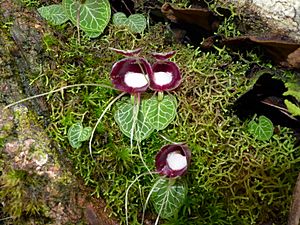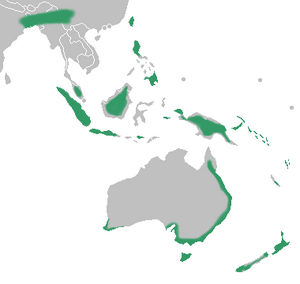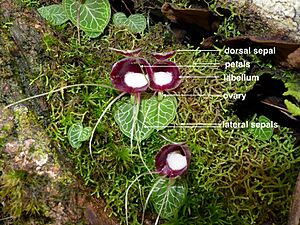Helmet orchids facts for kids
Quick facts for kids Helmet orchids |
|
|---|---|
 |
|
| Corybas pictus - a South-East Asian species | |
| Scientific classification |
|
| Kingdom: | Plantae |
| Clade: | Tracheophytes |
| Clade: | Angiosperms |
| Clade: | Monocots |
| Order: | Asparagales |
| Family: | Orchidaceae |
| Subfamily: | Orchidoideae |
| Tribe: | Diurideae |
| Subtribe: | Acianthinae |
| Genus: | Corybas Salisb. |
 |
|
| Corybas range map | |
| Synonyms | |
|
|
Corybas, also known as helmet orchids, is a group of about 120 different kinds of plants. These plants belong to the orchid family, called Orchidaceae. Helmet orchids are small plants that live for many years. They lose their leaves each year and usually grow on the ground.
Each helmet orchid plant has one leaf near its base. It also has a single flower on a short stem. The flower looks special because of its large top petal, called a dorsal sepal, and a unique lip-like part, called a labellum. You can find Corybas species in many places. These include Australia, New Zealand, New Guinea, Southeast Asia, the Himalayas, southern China, and many Pacific and sub-Antarctic islands.
Contents
What Helmet Orchids Look Like
Corybas orchids are plants that live for many years. They lose their leaves at certain times of the year. Most of them grow in the ground and do not have roots like other plants. Instead, they have a round, fleshy part underground called a tuber. New tubers grow from root-like stems called stolons.
Each plant usually has one leaf that is heart-shaped or round. This leaf often sits right on the ground. A short stem grows up from the leaf, holding a single flower at its top.
The Unique Helmet Orchid Flower
The flower of a helmet orchid has a short stem with a small, leaf-like part called a bract at its base. These flowers are often dull in color. They can look a bit like the fruiting body of a fungus. The top petal, or dorsal sepal, is much larger than the other petals. It often bends forward, forming a hood over the center part of the flower, called the column.
The side petals and sepals are very small and thin. One special petal, called the labellum, is usually the most noticeable part of the flower. It is large and shaped like a deep cup or tube. Its base is attached to the column. Sometimes, it has small, ear-like parts on its sides. The column itself is small and hidden by the labellum.
In cooler parts of the world, these orchids bloom between autumn and spring. In warmer, tropical areas, they can flower almost any month. After flowering, the plant produces a dry fruit called a capsule. This capsule can hold up to 500 tiny seeds. As the fruit ripens, the flower fades away. The flower stem then grows longer, up to 30 centimeters (12 inches) tall. This helps the seeds spread far away.
Naming and History of Helmet Orchids
The first formal description of a Corybas orchid was for Corybas aconitiflorus. This was done by Richard Anthony Salisbury. He named the genus Corybas because the flowers looked like the covered head of a Greek dancer. This dancer was called a Korybas. Korybas dancers wore crested helmets and worshipped the goddess Cybele. Their religious dances were wild and full of music.
In 2002, some scientists suggested splitting Corybas into many different groups. However, this idea is not widely accepted by most plant experts.
How Helmet Orchids Live and Grow
Scientists believe that small insects help pollinate helmet orchids. These insects might mistake the unusual flowers for fungi. Helmet orchids have not been studied much. This is partly because their flowers are small and do not last long. Also, it is hard to keep the flowers in good condition for study. Many helmet orchid species grow in groups, forming new plants from the original one. However, we don't know if all species do this.
Where Helmet Orchids Are Found
Helmet orchids grow in many different places around the world. You can find them in India, South China, Taiwan, the Malay Peninsula, Borneo, the Philippines, New Caledonia, Vanuatu, Ponape, Indonesia, New Guinea, the Solomon Islands, Australia (including Macquarie Island), New Zealand (including Chatham, Stewart, Auckland and Campbell Islands), Tahiti, Samoa, and the Society Islands.
In Australia, these orchids usually grow in damp, shady spots. They often grow among thick moss or on rotting logs. Sometimes, they share their habitat with other types of orchids.
Images for kids
-
Corybas diemenicus from N.S.W., Vic. and Tas.
-
Slaty helmet orchid C. incurvus from N.S.W., Vic, Tas. and S.A.
-
C. recurvus from W.A.
-
Corybas walliae from New Zealand
See also
 In Spanish: Corybas para niños
In Spanish: Corybas para niños
 | Bessie Coleman |
 | Spann Watson |
 | Jill E. Brown |
 | Sherman W. White |








